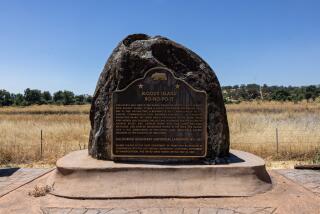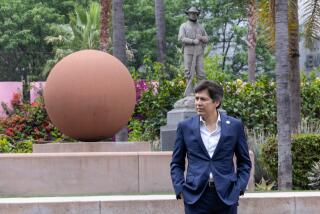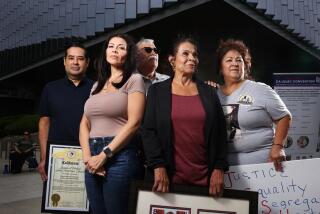j.a.p.s.s. Owners to Change Name, Need Cash First
After a heated public hearing in which Japanese-American groups attacked the name of the j.a.p.s.s. hair salon as âa disgusting racial slur,â the West Hollywood City Council has asked City Atty. Michael Jenkins for a legal opinion on what can be done to resolve the conflict.
But Mayor John Heilman said the city may be unable to intervene because the ownersâ constitutional right to freedom of speech may protect their selection of a name.
The owners have said they are willing to change the name but said it may take a year to do so. Some protesters have demanded that the name be changed by March 1.
âWhat I am hoping is that both sides will put aside their animosities and try to reach an acceptable solution,â Heilman said in an interview. âIt would be difficult for the city to do anything legislatively because of First Amendment concerns, so the best solution for everybody . . . is for the parties to resolve this themselves.â
Acronym of Five Names
At the public hearing in West Hollywood Park Auditorium, the salon ownersâ attorney, Steven Friedman, said the five partners named their salon j.a.p.s.s. as an acronym of the initials of their first names: Jerry Brennan, Armando Reyes, Peter Nagai, Shuji Kida and Simon Elcabas.
Friedman said that when the owners became aware of opposition to the name, they decided to change it.
But he said that they first must raise $10,000 to $15,000 to cover the costs of replacing the neon sign outside the salon at 9041 Santa Monica Blvd., printing new business cards and changing the advertising.
Friedman said that the salon, which is not quite 2 years old, was established through a $100,000 loan and that the owners need up to a year to raise the money for the changes.
Representatives of several organizations, including the National Coalition for Redress/Reparations, the Japanese-American Citizens League and the UCLA Asian Studies Center, argued at the Dec. 5 hearing that the salon name constitutes a racial slur.
David Monkawa of the coalition, which was formed to press for compensation for Japanese-Americans imprisoned in U.S. camps during World War II, asked the council to order that the sign be removed by Jan. 15 and the name be changed by March 1.
The coalition is picketing the salon on Saturdays, owners said.
In August, a salon sign was stolen, and another was covered with gray spray paint. The coalition has denied responsibility for the vandalism.
Awaiting End to Picketing
Friedman said the owners will not start counting the yearâs time within which they have said they would change the name until the picketing stops.
âThe name has got to go,â said Emily Mendoze of the UCLA Asian-American Studies Center. âItâs an insult to all people of Japanese ancestry, doubly so when the perpetrators of the insult are Japanese themselves.â
Two of the owners, Nagai and Kida, are from Japan. Kida said he sees nothing wrong with the name. âIt sounds strong,â he said, âand to me itâs nice.â Speakers from the Japanese-American Citizens League, which represents about 10,000 Japanese-Americans in the Southwest, are joining with the coalition in a petition drive pressing for the name change.
They said the use of the name is a reminder of anti-Japanese sentiment that led to the internment of about 110,000 Japanese-Americans during World War II.
âTo hear such words as were used with malice aforethought back then (during the war) only causes us to reopen these deep and very painful wounds,â said Terry Takeda of the leagueâs Marina chapter.
More to Read
Sign up for Essential California
The most important California stories and recommendations in your inbox every morning.
You may occasionally receive promotional content from the Los Angeles Times.










